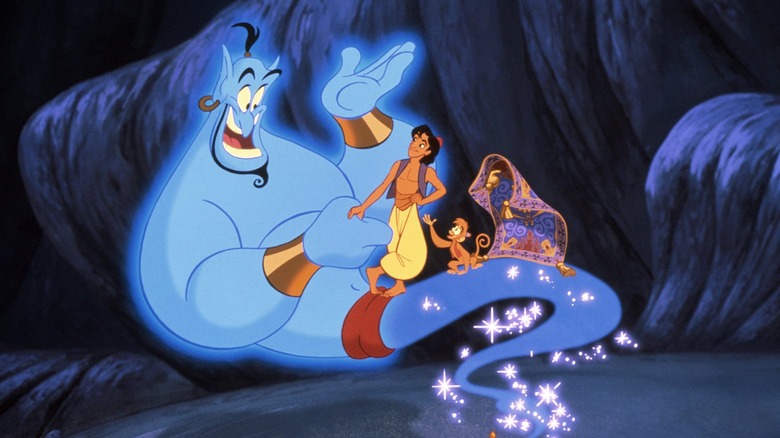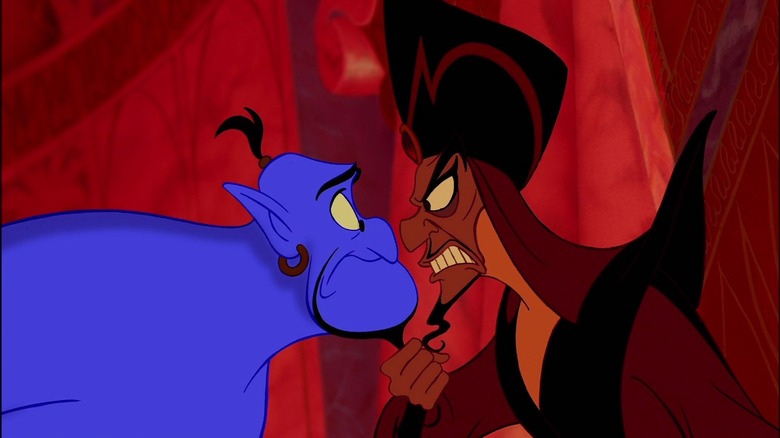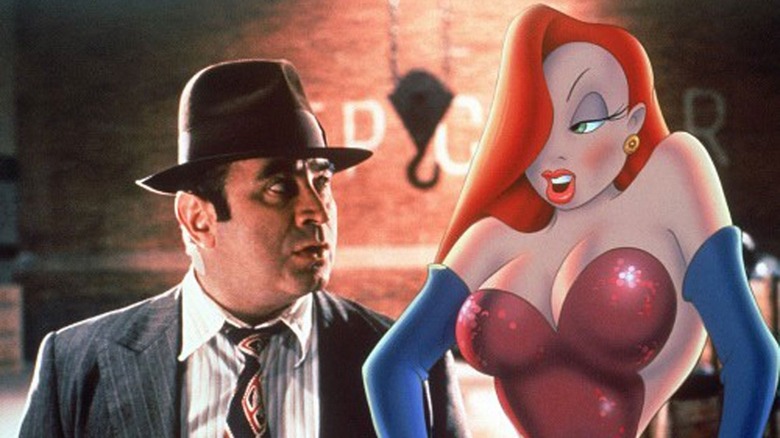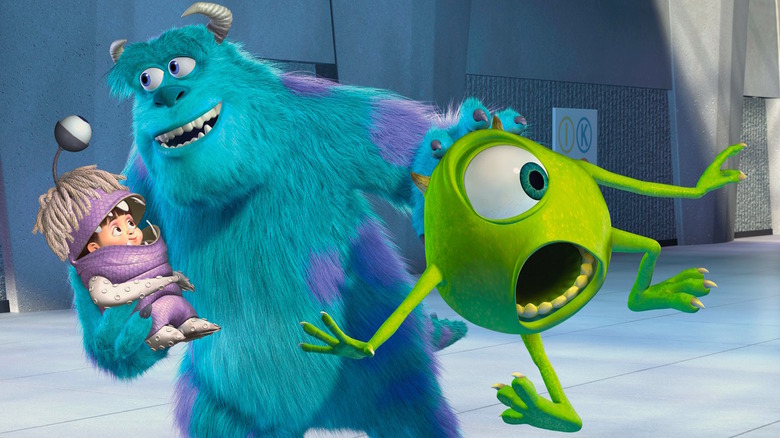How Robin Williams Changed The Voice Acting Business As We Know It
If you have spent an unreasonable amount of time over the past two years stuck indoors with kids, you'll have no doubt watched a ridiculous amount of computer animated content on Netflix or other streaming services. There seems to be an unending supply of it, and even the most third-rate efforts have well-known names voicing characters (here's looking at you, Chevy Chase in "Doogal"). As a result, my wife and I spend much of the film's running time asking each other: "Who's doing the voice of the sloth?" or "Isn't that... what's his name...?"
The presence of a well-known celebrity in a mediocre animated movie can turn it into... well, at very least a mediocre animated movie with a half-decent vocal performance in it. At their best, a Hollywood A-lister in the right part can create a classic character who is just as worthy as their award-winning live action roles. Just take Tom Hanks, voicing Sheriff Woody in "Toy Story" before CG-animated movies became all the rage, after back-to-back Best Actor Oscars for "Philadelphia" and "Forrest Gump."
Now it is commonplace for multi-award winners, exciting up-and-comers, comedians, stars of hit TV shows, veteran character actors, and celebrities you thought were dead to lend their voices to projects. Others have a whole franchise based around their voice and style, like Adam Sandler and his fondness for Borscht belt comedy in the "Hotel Transylvania" movies. In recent years there have been calls for a new Oscar category (via IndieWire) to celebrate the best vocal performances, and rightly so. Scarlett Johansson won a few Best Supporting Actress awards for her voice-only performance in "Her," but received no recognition from the Academy.
Big name vocal talent in animated movies are standard now, but it wasn't always the case. You can trace this boom all the way back to the early stages of the Disney Renaissance in the 1990s and an actor named Robin Williams.
Robin Williams as the Genie Changes the Game
"Aladdin" represents the best of both Disney and Robin Williams. The movie blew me away as a teen, and it was great watching it again with my young children recently, seeing them experience that same sense of exhilaration I had 30 years ago. The film is a wondrous ride even before the Genie first erupts from his lamp, and then the movie kicks into a whole other level. His opening number, "Friend Like Me," ranks among Disney's finest achievements, with the animators keeping pace with Williams' hyperactive vocal performance with a spectacular whirl of visuals that is almost avant garde in its sheer abundance of imagination.
To convince Williams to take the part, the directors asked Eric Goldberg, the senior animator for "Aladdin," to listen to one of the actor's comedy albums and animate a few skits with him as the Genie (via Los Angeles Times). The screenplay was written with Williams in mind and Goldberg's test piece completely sold him on the project. Williams put everything into the part in the recording studio, busting out his wide array of celebrity impersonations and clocking up 16 hours of improvised material other than his scripted dialogue (via Nerdist). His performance wasn't just about the jokes and funny voices, though. He also brought a great deal of heart to the role, making the Genie's relationship with Aladdin feel so sincere. He wasn't just a comedy sidekick firing off pop culture references (and selling merchandise), he was a real character, which made his eventual release from bondage such a feel good moment at the film's conclusion.
Voice Acting Before Robin Williams
The manic but heartfelt performance of Robin Williams not only delighted audiences and helped "Aladdin" become one of Disney's biggest box office successes, it also started a trend for celebrity voice actors to lend their voice to animated features, a trend which continues today. Prior to "Aladdin," however, it was rare for an A-lister to perform such roles.
The first examples of voiceover date all the way back to the 1860s (via Voquent) and up through to the first cartoon with animated dialogue in 1926, "My Old Kentucky Home," which is now often overlooked due to its use of racist language. Walt Disney himself provided the noises for Mickey Mouse in "Steamboat Willie" a few years later, and the studio's later Golden Age feature length animated pictures provided many unforgettable examples of voice acting, usually from talented voice actors, singers, or radio stars, from Cliff Edwards as Jiminy Cricket in "Pinocchio" to Eleanor Audley as Maleficent in "Sleeping Beauty." Meanwhile, over in "Looney Tunes," Mel Blanc was providing an array of now-legendary voice characterizations for Bugs Bunny, Daffy Duck, Yosemite Sam and Porky Pig, among others.
That's not to say famous screen actors didn't take voice roles before "Aladdin." George Sanders, the suave, well-known actor who won an Oscar for "All About Eve," played Shere Khan in "The Jungle Book;" James Earl Jones was a familiar face and voice since his screen debut in "Dr. Strangelove" before providing the distinctive voice of Darth Vader in "Star Wars;" Kathleen Turner, who made her name playing femme fatales in "Body Heat" and "The Man With Two Brains," voiced Jessica Rabbit in "Who Framed Roger Rabbit?"
Celebrity Voice Acting Since Aladdin
Since that landmark performance in "Aladdin," a huge range of big names have lent their distinct vocal abilities to animated movies, often forming perfect synergy with their characters. Just think of Jeremy Irons as the sinister Scar in "The Lion King;" Dwayne "The Rock" Johnson putting in the best performance of his career in "Moana;" or the irresistible double act of Billy Crystal and John Goodman in "Monsters Inc."
It's no coincidence that post-"Aladdin" stars have also started voicing characters in video games. Mark Hamill was one of the first to get onboard in 1993's "Gabriel Knight: Sins of the Father" and added dozens more titles to his resume since. As games became increasingly cinematic, many other famous faces followed suit, from Ray Liotta in "Grand Theft Auto: Vice City" to Keanu Reeves in "Cyberpunk 2077."
Robin Williams and the Genie were also influential in another way. It's easy to forget how fresh and original it was for a character in ancient Arabia to riff about cars, quiz shows, and doing Jack Nicholson impressions. Without the Genie's irreverence, would the "Shrek" movies even exist in their pop culture referencing, anachronistic needle-dropping form? Love it or hate it, the franchise has an outrageous amount of vocal talent, from Mike Myers, Eddie Murphy, Cameron Diaz, and John Lithgow to the British contingent of John Cleese, Julie Andrews, and Jennifer Saunders.
Despite how much I detest "Shrek" and the substandard ripoffs it inspired, the trend Robin Williams kickstarted 30 years ago is definitely a good thing, bringing quality and star power to so many animated features (even if it's not always necessary). There is plenty more to come in the New Year, too; watch out for Chris Evans taking over from Tim Allen in Pixar's "Lightyear" and Steve Carell in another "Minions" outing as his reformed supervillain Gru.



